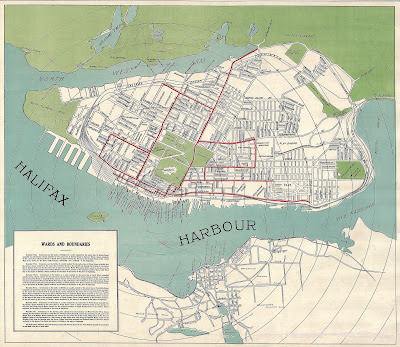Arrival and Processing
On July 29, 1924, after nearly three weeks at sea, the S.S. Asia docked at Pier 2 in Halifax with Abram Broitman on board. He had left his temporary home in Bucharest just weeks before, departing from Constanța on 9 July while Jewish aid organizations prepared for their arrival.
 |
| Halifax Harbour, circa 1920. Halifax Municipal Archives. A published map of Halifax and Dartmouth surrounded by business listings and advertisements, fire box numbers, a street index, and a geographic description of Halifax's wards and boundaries. Printing by Royal Print & Litho Limited. CR10-082 |
When they disembarked, the refugees were in rough shape. Previous groups had arrived “all looking haggard and tired out through sleepless nights and lack of food,” and this group was no different. In fact, when American representatives from the New York-based Joint Distribution Committee (JDC) saw the S.S. Asia passengers in Montreal a few days later – they happened to be there to discuss funding the refugee program -- they described the refugees as a "very scary spectacle:" 1
"[N]early all of them are underfed, and on this account, exposed to all sorts of ailments… [including some who have] contracted tuberculosis . . . The Canadian immigration officials were more than merciful in dealing with these 380 immigrants. The physical examination that they were subjected to, was carried on in a most merciful and sympathetic manner. Some of these aliens never would have been admitted to the United States, even in the absence of quota regulations.”
In Halifax, Abram and his fellow passengers disembarked at the pier and underwent the standard Canadian immigration inspections. Many of them likely would have been detained or even deported if not for the intervention of Canadian Jewish aid organizations. Volunteers from the Jewish Immigrant Aid Society (JIAS) – Mr. Charles Zwerling, Mr. Harry Kitz, and Miss Bertha Goldberg – were on hand to meet the ship, and they shepherded the refugees through the entrance procedures.
 |
| A group of 350 refugees who arrived at Halifax on SS Asia six months earlier than Abram Broitman in January 1924. Photo taken in the Halifax New Pier 2 Canadian assembly area. Ontario Jewish Archives, Item 694. |
A small office was provided for JIAS to use in the immigration building at Pier 2. After their initial inspections, Abram and his fellow passengers proceeded there to undergo further interviews. They were questioned about their occupations (Abram was a lumber merchant, but said he was a farmer;) marital status (Abram was married, but said he was single;) financial resources (Abram reported that he had $10;) and the names of any relatives in the U.S. or Canada (Abram mentioned that he had cousins in Philadelphia.) Unsurprisingly, the refugees displayed significant fright when faced with questions about their former homes in Ukraine, conditions in Romania, and the status of other refugees trapped in ports around Europe.
 |
| SS Andania and other vessels docked Pier 2, the Deep Water Terminals, Halifax, NS. W.R. MacAskill, Nova Scotia Archives, 1987-453, no. 2625. |
Allocation
Deciding where in Canada to send the refugees – to Montreal, Toronto, Winnipeg, or points west -- was tricky. The primary mandate of the JCA was to establish agricultural colonies where Jews could find a secure livelihood and economic self-sufficiency. This was in line with the conditions laid out by the Canadian Dominion government, which stipulated that a percentage of the new arrivals work in agriculture. But the refugees were not suited for farm work. Not only were they in poor physical condition, but they had absolutely no experience: back “home” in the Russian Empire, Jews had been explicitly barred from agricultural work.
Negotiations about assignments ensued, conducted via telegram and letter, among the various stakeholders in each location. Factors such as the health of the refugee, family composition, and proximity to relatives were supposed to be used to make the decision; but according to internal JCA correspondence, the determination was often left to the last minute, and it ultimately came down to how many refugees each community could absorb. While Abram had prudently indicated that he intended to be a farmer, his passenger record shows that he was instead assigned to Montreal, which was then crossed out and changed to Toronto.
The Journey West and Reception
Once their destination assignments were determined, Abram and his fellow refugees were escorted to special train cars on Canadian National Railways. According to an internal JCA memo2,
“A special car containing a cafeteria was attached to our training, which distributed hot water free to the immigrants. A reduced rate of 5¢ for a cup of tea or coffee was offered to those who wanted to drink their tea at the counter. A Pullman car was attached to the train to give us every possible comfort on our journey. Mr. Morrison and a special Inspector of the Dining Car and Pullman service were on board the training and extended to us every courtesy and assistance. A special conductor speaking Yiddish was ordered to accompany the immigrants as far as Winnipeg.”
When the train reached Montreal, only those assigned to be settled there were permitted to disembark. Everyone else was forced to remain on board with the train doors locked. Previously, refugees bound for Toronto and points west had been allowed to briefly disembark in Montreal; many of them promptly vanished into the city, simply failing to show up for the next leg of their journey west. The JCA representatives were determined not to let that happen again.
Of the 380 refugees who sailed on the S.S. Asia, 49 were sent to Toronto, Abram among them. Upon arrival, they were greeted by representatives of JIAS and the local Jewish community. Records from November 1924 list Abram’s address as “Toronto, Ontario; Ave. 11.”
Abram was finally safe. His family, however, was still in Romania -- and still in jeopardy.
No comments:
Post a Comment